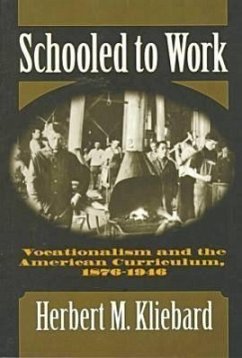Tracing the evolution of job training as an educational ideal, Kliebard analyzes the construction of vocationalism through three stages. In the first, manual training is promoted as a pedagogical reform and moral corrective. In the second stage, vocational training for the new industrial workplace emerges as a major component of the American curriculum and contributes to its bifurcation. In the final stage, preparation to enter the workforce begins to eclipse other educational purposes. Concluding with a Deweyan critique of vocationalism, this book offers a much-needed perspective with which to view current debates about the meaning of public education and the transition from "school to work."
Hinweis: Dieser Artikel kann nur an eine deutsche Lieferadresse ausgeliefert werden.
Hinweis: Dieser Artikel kann nur an eine deutsche Lieferadresse ausgeliefert werden.








